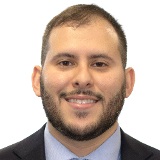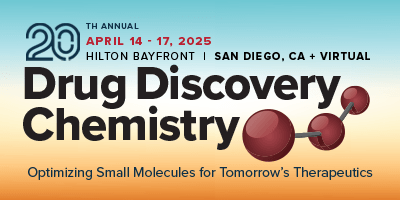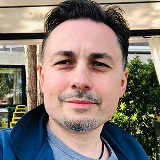2025年 晚餐短期課程* (僅限面對面實體會議)
Drug Discovery Chemistry的短期課程旨在具有指導性、互動性,並提供關於特定主題的深入資訊,以及貫穿始終的問答機會。這些課程為剛接觸這個領域的新手及希望了解更多資訊的人闡述說明在主體會議的簡報單元囚於時間限制而不及深入的抜術面入門知識。講師來自業界和學術界,其中多數是該領域公認的權威或具有教學經驗的指導者。
短期晚餐課程將於 4 月 14 日星期一和 4 月 16 日星期三晚上舉行,對現場與會者開放。
*需要較高價報名費或單獨報名
2025年4月14日(星期一)下午 6:00 - 8:30
SC1: Protein Degraders: A Beyond Rule of Five Space and in vitro ADME Perspective
Detailed AgendaInstructors:
John Erve, PhD, President, Jerve Scientific Consulting
Stefanus Steyn, PhD, Research Fellow, Pharmacokinetics Dynamics & Metabolism, Pfizer
Topics to be Covered:
- Comparison of Rule of Five and Beyond Rule of Five space
- Importance of intramolecular hydrogen bonds for solubility and permeability
- Determining chameleonicity and its importance for PROTACs
- Transporters and potential drug-drug interactions (DDIs)
Who Should Attend:
Scientists in the field of proteolysis-targeting chimeras (PROTACs) who would like to deepen their understanding of these molecules and the physicochemical attributes that may contribute to their success as oral drugs. ADME scientists and medicinal chemists wishing to understand PROTACs from a drug safety and metabolism perspective. Graduate students and academic scientists interested in learning more about this rapidly developing new drug modality.
INSTRUCTOR BIOGRAPHIES:
 John Erve, PhD, President, Jerve Scientific Consulting
John Erve, PhD, President, Jerve Scientific Consulting
 Stefanus Steyn, PhD, Research Fellow, Pharmacokinetics Dynamics & Metabolism, Pfizer
Stefanus Steyn, PhD, Research Fellow, Pharmacokinetics Dynamics & Metabolism, Pfizer
SC2: Fragment-Based Drug Design: Advancing Tools and Technologies
Detailed AgendaInstructors:
Ben J. Davis, PhD, Research Fellow, Biology, Vernalis R&D Ltd.
Daniel A. Erlanson, PhD, Chief Innovation Officer, Innovation and Discovery, Frontier Medicines Corporation
Topics to be Covered:
- Pros and cons of fragment-based approaches
- What makes a good fragment; properties of a good fragment library
- Finding, validating, and characterizing low-affinity ligands
- The importance of using orthogonal screening methods
- What to do with a fragment-growing, linking, and more
INSTRUCTOR BIOGRAPHIES:
 Ben J. Davis, PhD, Research Fellow, Biology, Vernalis R&D Ltd.
Ben J. Davis, PhD, Research Fellow, Biology, Vernalis R&D Ltd.
 Daniel A. Erlanson, PhD, Chief Innovation Officer, Innovation and Discovery, Frontier Medicines Corporation
Daniel A. Erlanson, PhD, Chief Innovation Officer, Innovation and Discovery, Frontier Medicines Corporation
SC3: Fundamentals of Generative AI for Drug Discovery
Detailed AgendaInstructors:
Parthiban Srinivasan, PhD, Professor and Director, Centre for AI in Medicine, Vinayaka Mission's Research Foundation, India
Petrina Kamya, PhD, Global Head of AI Platforms & Vice President, Insilico Medicine; President, Insilico Medicine Canada
Topics to be Covered:
- Demystifying generative AI concepts and key terminologies
- How predictive and generative AI works in de novo molecular design
- Overview of large language models (LLMs)
- Prompt engineering, RAG, and fine-tuning for biopharma-specific LLMs
- Leveraging language models in drug discovery research with case studies
Who Should Attend:
INSTRUCTOR BIOGRAPHIES:
 Parthiban Srinivasan, PhD, Professor and Director, Centre for AI in Medicine, Vinayaka Mission's Research Foundation, India
Parthiban Srinivasan, PhD, Professor and Director, Centre for AI in Medicine, Vinayaka Mission's Research Foundation, India
 Petrina Kamya, PhD, Global Head of AI Platforms & Vice President, Insilico Medicine; President, Insilico Medicine Canada
Petrina Kamya, PhD, Global Head of AI Platforms & Vice President, Insilico Medicine; President, Insilico Medicine Canada
SC4: Detecting Target Engagement: Technology Innovations
Detailed AgendaInstructors:
Hans-Peter N. Biemann, PhD, Distinguished Scientist, Integrated Drug Discovery, Sanofi
Jonathan Brooks, Principal Scientist, Inflammation & Remodeling, Pfizer Inc.
Can Ozbal, PhD, CEO, Momentum Biotechnologies
Elmar Nurmemmedov, PhD, MBA, Co-Founder & CEO, CellarisBio
Topics to be Covered:
(1) Fluorescence Resonance Energy Transfer (FRET) & Cellular Target Engagement by Elmar Nurmemmedov, CellarisBio
- Why measuring cellular target engagement early in drug discovery is important for challenging drug targets
- Pros and cons of fluorescence-based Micro-Tag cellular target engagement methods and comparison to other cell target engagement methods
- Case studies and novel applications of fluorescence-based Micro-Tag cellular target engagement method
(2) Affinity Selection Mass Spectrometry (ASMS) by Hans Biemann, Sanofi and Can Ozbal, Momentum Bio
- Overview of ASMS as a biophysical assay technique
- ASMS for highthroughput screening
- ASMS for compound binding studies
- Sanofi case studies
(3) SPR Microscopy for Membrane Proteins by Jonathan Brooks, Pfizer
- Introduction to SPRm and ligand tracer platforms
- Examples of SPRm applied to cell binding kinetics
- Cell attachment strategies for SPRm
- Working with live and fixed cells
- Binding of large v. small molecules
INSTRUCTOR BIOGRAPHIES:
 Hans-Peter N. Biemann, PhD, Distinguished Scientist, Integrated Drug Discovery, Sanofi
Hans-Peter N. Biemann, PhD, Distinguished Scientist, Integrated Drug Discovery, Sanofi
 Jonathan Brooks, Principal Scientist, Inflammation & Remodeling, Pfizer Inc.
Jonathan Brooks, Principal Scientist, Inflammation & Remodeling, Pfizer Inc.
2025年4月16日(星期三)下午 6:15 - 8:45
SC5: Protein Degraders: An in vivo ADME and Safety Perspective
Detailed AgendaInstructors:
Donglu Zhang, PhD, Senior Fellow, DMPK, Genentech Inc.
John Erve, PhD, President, Jerve Scientific Consulting
Topics to be Covered:
- Measuring ADME properties in vitro and in vivo and specific challenges
- Metabolism of PROTACs and influence of linker length on stability
- Case study of optimizing a PROTAC
- Safety issues unique to PROTACs
- Circadian rhythm considerations
Who Should Attend:
INSTRUCTOR BIOGRAPHIES:
 Donglu Zhang, PhD, Senior Fellow, DMPK, Genentech Inc.
Donglu Zhang, PhD, Senior Fellow, DMPK, Genentech Inc.
 John Erve, PhD, President, Jerve Scientific Consulting
John Erve, PhD, President, Jerve Scientific Consulting
SC6: Chemical Biology for Covalent Drug Discovery, Phenotypic Screening, and Target Deconvolution
Detailed AgendaInstructors:
Paul Brennan, PhD, Professor, Nuffield Department of Medicine, University of Oxford
Brent Martin, PhD, Vice President, Chemical Biology, Odyssey Therapeutics
Angelo Andres, Senior Scientist, Chemical Biology, AstraZeneca Pharmaceuticals
Topics to be Covered:
- Chemical biology assays and probes for target engagement and mechanistic understanding
- Chemoproteomic methods and reagents for covalent ligand drug discovery
- Comparison of various chemical biology approaches (mass spectrometry, affinity-bead methods, proximity labeling proteomics, and more)
- Use of quantitative mass spectrometry-based proteomics and global proteomics
- Discovery of chemical probes
- Constructing annotated chemogenomic compound sets for phenotypic screening
- Cysteine profiling and covalent inhibitors for target discovery and occupancy
- Design and screening of chemogenomics libraries for target identification
- Case studies highlighting use of proteomics for target engagement and deconvolution
INSTRUCTOR BIOGRAPHIES:
 Paul Brennan, PhD, Professor, Nuffield Department of Medicine, University of Oxford
Paul Brennan, PhD, Professor, Nuffield Department of Medicine, University of Oxford
 Brent Martin, PhD, Vice President, Chemical Biology, Odyssey Therapeutics
Brent Martin, PhD, Vice President, Chemical Biology, Odyssey Therapeutics
 Angelo Andres, Senior Scientist, Chemical Biology, AstraZeneca Pharmaceuticals
Angelo Andres, Senior Scientist, Chemical Biology, AstraZeneca Pharmaceuticals
SC7: AI Applications in Drug Development: Strategies for Innovation and Integration
Detailed AgendaInstructor:
Arvind Rao, PhD, Associate Professor, Department of Computational Medicine and Bioinformatics, University of Michigan
Topics to be Covered:
- AI applications in target discovery and predictive diagnostics
- Machine learning strategies for patient stratification and personalized medicine
- Frameworks for scaling AI initiatives across pharmaceutical organizations
- Critical considerations for implementing and managing AI projects
- Ethical implications and emerging trends in AI-driven drug development
Who Should Attend:
INSTRUCTOR BIOGRAPHIES:
 Arvind Rao, PhD, Associate Professor, Department of Computational Medicine and Bioinformatics, University of Michigan
Arvind Rao, PhD, Associate Professor, Department of Computational Medicine and Bioinformatics, University of Michigan
SC8: Principles of Drug Design: Ligand-Receptor Interactions and More
Detailed AgendaInstructor:
Maricel Torrent, PhD, Principal Research Scientist, Computational Drug Discovery, AbbVie, Inc.
Topics to be Covered:
- Medicinal chemistry and structure-based drug design principles
- Interpretation of atomic-level protein X-ray and modeled structures of binding mode
- Understanding the relative amounts of potency gain from different types of interactions
- Case studies to illustrate all the design strategies
INSTRUCTOR BIOGRAPHIES:
 Maricel Torrent, PhD, Principal Research Scientist, Computational Drug Discovery, AbbVie, Inc.
Maricel Torrent, PhD, Principal Research Scientist, Computational Drug Discovery, AbbVie, Inc.
SC9: DNA-Encoded Libraries
Detailed AgendaInstructors:
Svetlana Belyanskaya, PhD, Co-Founder, DEL Source; former Vice President, Biology, Anagenex
Ghotas Evindar, PhD, Co-Founder & President, DEL Source; former DEL Platform Senior Manager and Group Leader, GSK
Topics to be Covered:
- Introduction to DNA-encoded libraries
- Pros and cons of using DNA-encoded chemical libraries
- Structure of the DNA coding region and how it has evolved over time
- Affinity-based selection strategy and how it guides hit-picking
- Data analysis and the decision-making logic in hit confirmation
- Introduction to and benefits of one-bead, one-compound (OBOC) DNA-encoded libraries
INSTRUCTOR BIOGRAPHIES:
 Svetlana Belyanskaya, PhD, Co-Founder, DEL Source; former Vice President, Biology, Anagenex
Svetlana Belyanskaya, PhD, Co-Founder, DEL Source; former Vice President, Biology, Anagenex
 Ghotas Evindar, PhD, Co-Founder & President, DEL Source; former DEL Platform Senior Manager and Group Leader, GSK
Ghotas Evindar, PhD, Co-Founder & President, DEL Source; former DEL Platform Senior Manager and Group Leader, GSK
* 活動內容有可能不事先告知作更動及調整。
2025年 4月 14日

降解劑和分子膠:超越腫瘤學

基於共價鍵結/鄰近導引的治療

生成式 AI 和預測建模

女性健康用藥物研發

RNA修飾的小分子藥物
2025年 4月 15 - 16日

降解劑和分子膠 - PART1

片段藥物發現(FBDD)

用於早期藥物發現的AI/ML - PART1

GLP1・口服胜肽

發現化學的新興技術
2025年 4月 16 - 17日

降解劑和分子膠 - PART2

蛋白質間相互作用(PPI)

用於早期藥物發現的AI/ML - PART2

DEL(DNA-Encoded Library)

轉錄因子和調節因子的給藥










